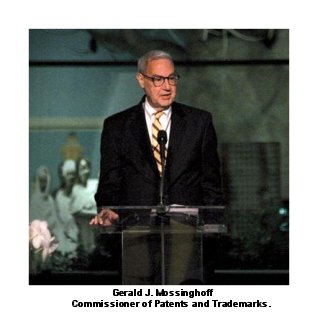|
Cabinet Council on Commerce and Trade The Cabinet Council on Commerce and Trade was established on February 26, 1981 by the Reagan Administration. Gerald J. Mossinghoff served as an Assistant Secretary of Commerce, Commissioner of Patents and Trademarks. He stated, "President Reagan supported a strong patent system...Secretary of Commerce, Malcolm Baldrige, was the head of the Cabinet Council on Commerce and Trade, and he gave him complete discretion in formulation of patent policy for the Department of Commerce. He re- called, "When I saw that Mac Baldrige was the head of the [Administration's Special Committee on] Commerce and Trade, I told him that there really ought to be...a senior-level committee on intellectual property, and I should chair it. Secretary Baldrige agreed and set up the Working Group on Intellectual Property of the Cabinet Council on Commerce and Trade..." Wikipedia ABA Addresseses (Click Here) Gerald J. Mossinghoff's correspondence Working Group on Intellectual Property The working group advised President Reagan concerning many matters, most notably, the establishment of a Court of Appeals for the Federal Circuit, which strengthened and brought certainty to patent law in the United States. The group initiated a far-reaching automation program at the USPTO to computerize the office's database. The WGIP took public comment and studied matters such as:
Consolidation The Cabinet Council on Commerce and Trade's Work- ing Group on Intellectual Property (WGIP), folded in the mid-1990s into the President's Economic Policy Council. The location of the records of the Cabinet Council on Commerce and Trade is unknown. Some records are located in the Ronald Reagan Presidential Library. References
External links http://www.reagan.utexas.edu/archives/speeches/ 1981/22681d.htm
|
Further Guidance for Researchers After doing research on this topic to edit the Wikipedia entry, I made further attempts to collect primary content. I first searched the Reagan Library web. There is an archives link. This leads to various ways to access categories of data. Because at the end of the process, there was very little on the IP Working Group, I will not describe the documents or process in detail. The site is complex. I performed and advanced Google search of the entire archive and reviewed each search result. The WHITE HOUSE OFFICE OF RECORDS MANAGEMENT (WHORM) SUBJECT FILE, 1981-1989 - offers numerous individual case files available for research from closed subject categories in response to Freedom of Information Act requests. For access to these case files, you should refer to the topic finding aids. There is a file covering the Cabinet but upon examination the scope note shows no connection to the IP Working Group. Upon contacting the Reagan Library I was informed that the Council was reduced to two Groups in Reagan's second term and IP was not one of them. So research should be restricted to his first term. Materials on the IP Working Group would be in the research area. Access to the research area requires an archivist to be at the library, and the archivists are not at the library on the weekends. A search of Reagan speeches yielded little on this topic. The Reagan Library search engine yielded few hits on intellectual property. More searches would likely yield more insight into Reagan and IP.
From a Message to the Congress on "A Quest for Excellence" - January 27, 1987
The speech elaborates : Better Protecting Intellectual Property
________________________________________ These speeches can also be found in the Federal Register and other databases. I leave it to scholars to further analyze the source documents to make conclusions. My final research task was to contact Gerald Mossinghoff. Research rule one is to use a human. Since he was Assistant Secretary of Commerce and Commissioner of Patent and Trademarks; Chairman, Working Group on Intellectual Property, Cabinet Council on Commerce and Trade, what better resource could be found to further the research or end the process. His correspondence confirmed that there were no reports issued by the Group. He reported on IP matters during the Reagan administration annually to the ABA Section on IP. These were published in the Journal of the Patent Office. I hope anyone interested in this topic find this site useful. |




